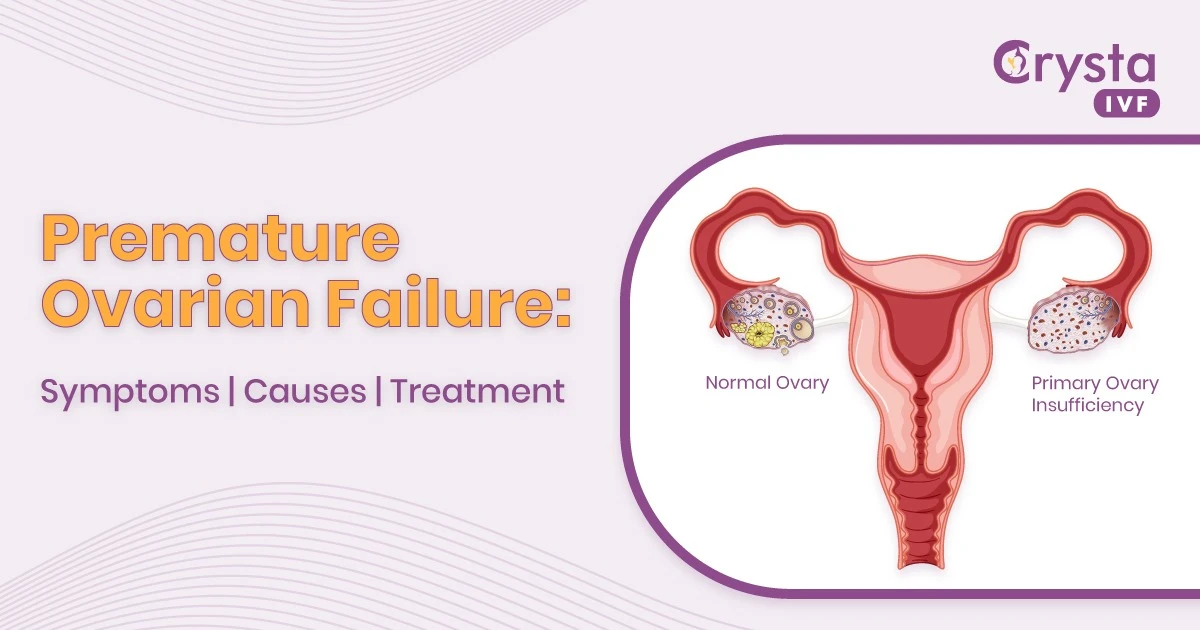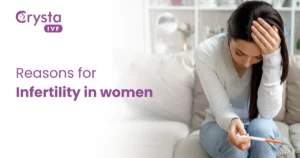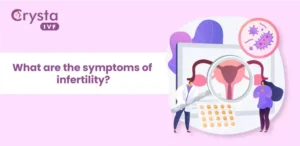The National Infertility Association estimated that one in every 1,000 girls between the ages of 15 and 29 suffers from Premature Ovarian Failure. In general terms, it is referred to as Early Menopause. But this is not the case.
In menopause, a female will never get their period back and will not be able to conceive. In contrast, a person with Premature Ovarian Failure or POI may continue to have their period and can get pregnant.
Premature Ovarian Failure or Premature Ovarian Insufficiency: Are both terms different?
Premature ovarian failure was the prior term for primary ovarian insufficiency. However, because research has shown that individuals with POI can experience intermittent ovulation, the doctors prefer to call it “insufficiency” instead of “failure.”
This implies that even if you have Premature Ovarian Insufficiency, you can still release an egg and become pregnant. In actuality, 5% to 10% of those diagnosed with POI will conceive naturally. This is why it is also called “Decreased Ovarian Reserve.”
What are Premature Ovarian Failure Symptoms?
It may be challenging to notice some specific symptoms of premature ovarian failure, particularly in the early stages of this problem. In some situations, women with polycystic ovary syndrome (PCOS) may still be able to conceive and have regular periods.
Nonetheless, consulting with an expert infertility doctor is the best thing you can do for your POF.
If you encounter one or more of the following symptoms, you should think about connecting with a fertility expert instantly:
- Period Irregularities
The hormonal changes brought on by early ovarian failure may induce disturbances in the menstrual cycle, which may produce irregular or absent periods.
- Infertility Issues
POF frequently results in a decrease in fertility, and women who suffer from the illness experience infertility issues.
- Anxiety and Sadness
Hormonal changes have a big effect on mood and can occasionally lead to anxiety, sadness, and depression.
- Night Sweating
Hot flashes and night sweats occur after POF and are similar to the symptoms of natural menopause and are linked to hormonal changes.
- Low Sex Drive
Imbalances in hormones might cause a person to become less interested in having sex.
- Reduced Estrogen Levels
POF can alter estrogen levels in the body resulting in dryness and discomfort in vaginal tissues during sexual activity. Vaginal dryness and painful intercourse are related concerns.
- Memory Problem:
Hormonal changes may reduce cognitive function, leading to memory problems.
Also Read: Poor Egg Quality: Symptoms, Causes, And Treatment
What are Premature Ovarian Failure Causes?
Ovulation issues are becoming common in India. However, Premature ovarian failure is still extremely uncommon. In India, roughly a million cases have been reported annually regarding POF. The reason for the causes of premature ovarian failure involves:
- Autoimmune Disease:
Autoimmune disease is rarely found to be the cause of POF. In this condition, the female body’s immune system attacks her ovarian tissue with antibodies damaging the follicles that hold the egg.
- Impact of Toxins:
Chemotherapy and radiation therapy are two powerful medical treatments that have a lot of side effects. It can destroy a cell’s genetic DNA and result in ovarian failure. The ovarian tissues are also affected by several things, such as pollutants, chemicals, insecticides, smoke, etc.
- Chromosomal Defects:
Genetic diseases that can be handed down through generations are a primary cause of premature ovarian failure. It includes Turner syndrome, in which the woman’s X chromosome becomes brittle and breaks.
Also Read: What is Low AMH? Causes and Symptoms
How Premature Ovarian Failure Diagnosis is Done?
Premature ovarian failure is typically diagnosed by combining several factors, such as:
- Medical History:
The fertility doctor will learn more about the female’s past medical conditions, such as irregular menstruation or skipped cycles. They will also evaluate the family history for any occurrences of early menopause or infertility.
- Physical Examination:
A comprehensive physical examination will be conducted to identify any symptoms or indicators of hormone abnormalities.
- Blood Tests:
A blood test is performed to determine the levels of hormones such as follicle-stimulating hormone (FSH) and estradiol, which helps assess the health of the ovaries.
- Imaging Studies:
Doctors can suggest undergoing certain imaging tests to assess the ovaries and find abnormalities through ultrasound and X-ray.
When to See a Doctor?
Consult with a senior infertility specialist to know the problem behind your early menopause. If you haven’t had your period in three months or longer, you can book a FREE consultation at Crysta IVF Centre in Delhi and discuss the issue with the doctor.
Pregnancy, stress, diet, exercise, or other factors can cause you to miss your period. However, if the situation doesn’t improve, connecting with a doctor is better.
How Premature Ovarian Failure Treatment is Done?
Premature ovarian failure has no permanent cure, but several treatments can help control symptoms and enhance the quality of life:
Hormone Replacement Therapy (HRT)
HRT is used to treat vaginal dryness and hot flashes that can result in POF. HRT helps to restore the hormones that the ovaries can’t produce.
Fertility Treatment
If a woman with polycystic ovarian failure wants to conceive, IVF is one of the options. In IVF, the eggs from the females or donors are fertilized with the sperm of a male to produce a zygote in vitro. Consult with a doctor to get more information about how IVF can help with POI or POF.
Lifestyle Modifications
Changing to a healthier lifestyle by exercising regularly and consuming a well-balanced diet can improve your health and reduce the chances of undergoing POF.
Even though premature ovarian failure is a painful diagnosis to receive, it’s crucial to talk to a doctor before choosing any treatment.
Takeaway
Premature Ovarian Failure is the result of decreased egg production from the ovaries. Although the exact cause is difficult to diagnose, there are certain treatments to help the functioning of the ovaries.
A doctor can diagnose the female through blood tests and medical history to understand the cause of the problem and then suggest the appropriate treatment method.
Prevention is the best treatment any female can perform. Always take preventive measures to avoid such serious issues and get a regular health checkup to know how your body is performing.




